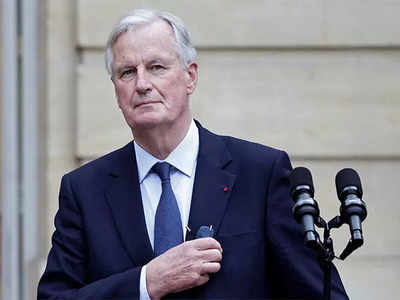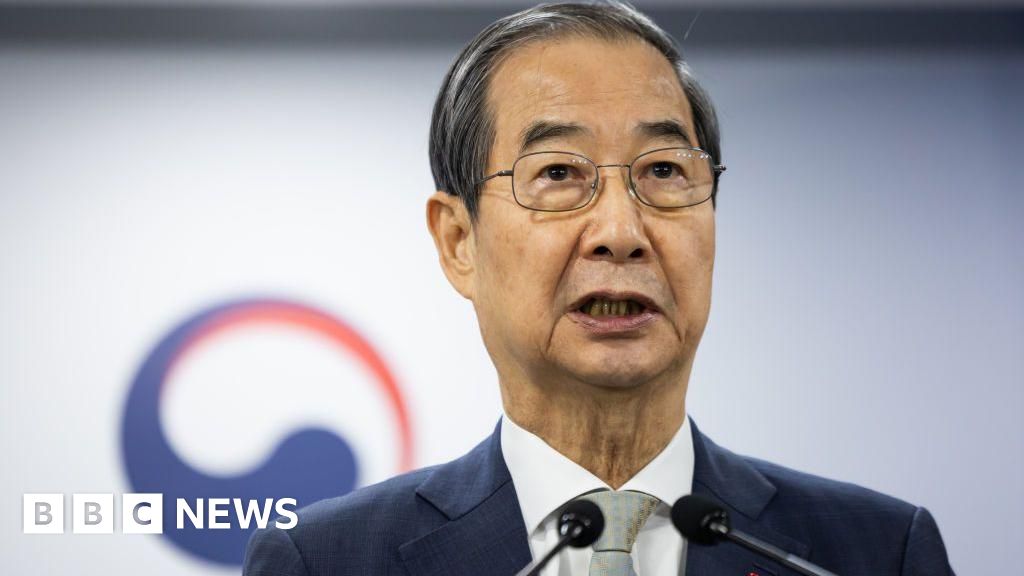
Barnier’s tenure was the shortest for a premier since France’s Fifth Republic was founded in 1958.
Emmanuel Macron is looking for a new prime minister on Thursday after the far right joined forces with the left to push through a no-confidence motion against his government over a budget dispute.
The French president needs to find a premier who can pass a 2025 budget through a deeply divided parliament.
But any new leader will face the same financial squeeze that brought down
Prime Minister Michel Barnier
’s administration.
The budget bill presented by Barnier — that sank with his government — contained €60 billion ($63 billion) in tax increases and spending cuts that aimed for a reduction in the deficit to 5% of economic output in 2025, from an estimated 6.1% this year.
The French president is due to make a statement at 8pm on Thursday.
Far-right leader Marine Le Pen
teamed up with a left-wing coalition to topple Barnier late Wednesday, pitching the country into a prolonged period of turbulence that’s likely to further unsettle investors.
With the result of the vote widely anticipated, the euro was little changed around $1.0514 after the result and French bond futures gave up some of their earlier gains.
Barnier’s tenure was the shortest for a premier since
France’s Fifth Republic
was founded in 1958. Barnier, a seasoned conservative and the EU’s chief Brexit negotiator, was appointed in September.
There is little to suggest that the current stalemate will end so easily for Macron as the next premier will be subject to the same parliamentary calculus and risk of censure.
Macron has the authority to appoint a new prime minister, but he had a lengthy struggle before he managed to win limited support for Barnier from a fragmented parliament.
The roots of the current turmoil date back to June, when Macron dissolved parliament and called a snap vote as he sought to rebound from a crushing defeat for his party in the European elections — where Le Pen’s party won more than double the president’s party.
Instead, he made Le Pen’s National Rally the largest party in parliament and its leader became the country’s most influential power broker as his centrist coalition crumbled.
Following the June ballot, the lower house was split into three fiercely opposed blocs: a diminished center supporting the president, a leftist alliance and the far right led by Le Pen. That makeup won’t change as a new parliamentary election can’t be held until July at the earliest.
The divisions between those groups have been exacerbated by the economic problems facing France, with the budget deficit set to exceed 6% of GDP this year and voters reluctant to accept spending cuts or higher taxes.
“To those who think I’m intent on choosing a policy of disaster through a vote of no confidence, I want to tell them that the disastrous policy would be not to censure such a budget,” she told lawmakers on Wednesday. “It’s the end of this ephemeral government.”
What happens next:
- The outgoing cabinet remains in place with limited powers and will likely rely on untested emergency legislation to collect taxes and enact crucial spending
- The French president is solely responsible for appointing a new premier, but there is no constitutional time limit for a decision and no obvious candidate — it took Macron nearly two months to settle on Barnier
- Once named, a new premier proposes a cabinet, appointed by the president, and then has to send a new 2025 budget bill to parliament
- A new legislative election can’t be held before July
The chaos in the European Union’s second-biggest economy has prompted bond investors to punish France’s sovereign debt relative to its peers. Barnier warned of a “storm” in financial markets if he was ousted.
The outgoing administration will continue in a caretaker capacity for the time being, allowing the government to avoid a US-style shutdown. Barnier can use emergency laws to collect taxes and guarantee a minimal level of spending, but the broader impact is hard to predict.
Finance Minister Antoine Armand warned Tuesday that stopgap legislation would raise taxes for millions of households and block planned spending increases for some priorities, including security and farming.
Following the vote, Le Pen said that she is willing to work with another government, so long as they work with her party to draw up the budget. “This budget was toxic for the French,” she said in an interview on French television. Instead, she said, the country needs “a budget that’s acceptable to all.”
Barnier became the first French prime minister to lose a no-confidence vote in more than 60 years. The only other premier to be ousted under the Fifth Republic was Georges Pompidou in 1962 and, with the backing of the powerful president, Charles de Gaulle, he was eventually reappointed.
Le Pen has been ramping up the pressure on Macron to resign as a way to break the impasse and allow France to move forward.
“It’s up to his conscience to decide whether he can sacrifice public action and the fate of France to his own pride,” she said during the debate.
Macron has said he won’t step down until his term ends in 2027 and he can’t be forced out of his job. Le Pen is the frontrunner for the next presidential election, according to opinion polls.
Possible Barnier successors:
- Bernard Cazeneuve, 61: A former prime minister and interior minister under Socialist President Francois Hollande. He was already considered as a possible premier this summer before Macron picked Barnier. Tapping Cazeneuve could potentially help Macron fracture the left-wing bloc.
- Sébastien Lecornu, 38: In 2022, he became the youngest defense minister since the French Revolution. He’s a Macron loyalist who originally came from the center-right Republicans party. The skilled politician has been a minister since Macron became president and has overseen a jump in military spending.
- François Bayrou, 73: The veteran centrist is the leader of the MoDem party, a key Macron ally in parliament. Currently the high commissioner for government planning, Bayrou supports proportional representation in parliamentary elections, which has also been backed by the National Rally.
- Jean Castex, 59: A former prime minister under Macron known for his southern French accent and his management skills. Currently the head of the RATP, the state-owned company that operates the Paris metro.
And finally...
Barnier, 73: Macron could re-name the outgoing prime minister. Barnier did, however, appear to rule himself out on Tuesday. “I want to serve,” he said “But what does it mean if I fall tomorrow, and the day after you find me back here, as if nothing had happened?”

 3 weeks ago
9
3 weeks ago
9










 English (US) ·
English (US) ·